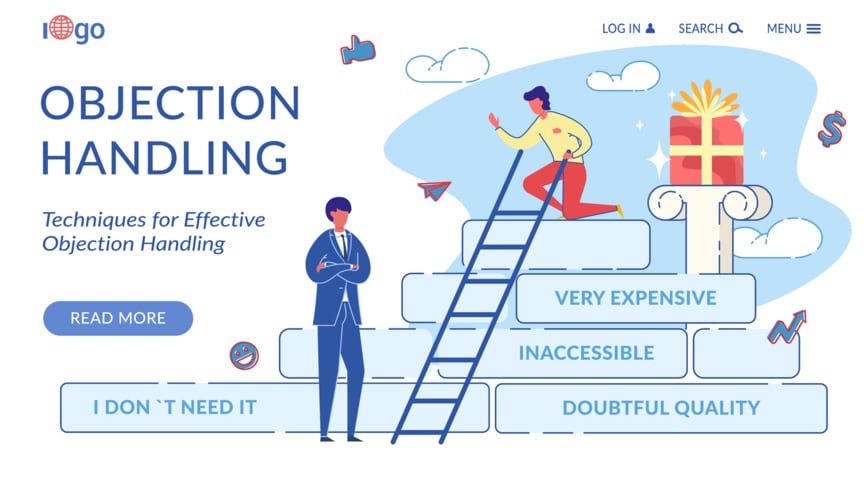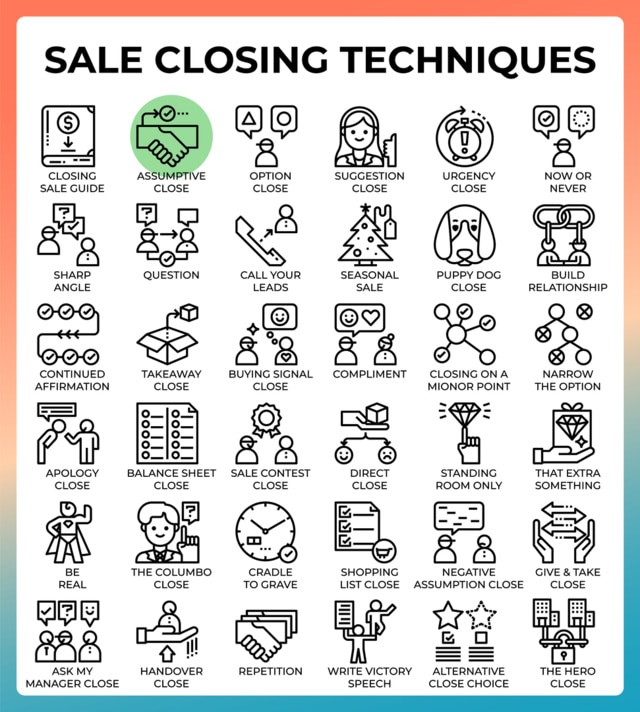Even in 2023, sales objections continue to be a formidable hurdle in the path of sealing deals. A whopping 35% of salespeople say that overcoming objections is one of their biggest challenges. The ability to skillfully navigate these objections is an indispensable skill in any successful salesperson’s arsenal.
In this comprehensive guide, we delve deep into the world of sales objections, dissecting different types and equipping you with effective strategies to counter them. By the end of this guide, you’ll not only have a more profound understanding of sales objections but also be armed with the tools and knowledge to tackle them head-on. Let’s jump in!

What Are Sales Objections and Why Do They Happen?
Sales objections are a common part of a sales job. They are used by prospects to express their concerns and objections to the proposed solution. It’s more important than ever to be prepared to address sales objections quickly and effectively. To do so, it’s essential to understand the underlying meaning behind the objection.
Sales objections can be divided into three main categories: price, features, and trust.
- Price objections are related to the cost of the product or service
- Feature objections are related to the features or capabilities of the product or service
- Trust objections are related to the trustworthiness of the company or the salesperson.
By understanding the root cause of the objection, salespeople can tailor their response to address the prospect’s concerns. For example, if the objection is related to price, a salesperson can focus on the product’s value and quality. If it’s related to features, they can provide additional information about how their product is better than what the competition offers.
By being prepared to address sales objections, salespeople can increase their chances of closing a sale. With the right knowledge and preparation, salespeople can become more effective at overcoming sales objections in 2023.

How To Respond To Price-Related Objections
Price-related objections are objections related to the cost of the product or service being offered. These objections can include concerns around affordability, perceived value for money, or a lack of understanding about how pricing works.
Price-related objections often arise when prospects compare your offering to that of the competition or have difficulty understanding why your pricing is higher than a competitor’s. To respond to these objections, salespeople need to focus on two key areas: value and quality.
Here are a few examples, along with potential responses that can help you navigate these situations effectively.
Objection 1: “It’s too expensive.”
This is probably the most common objection you’ll hear.
Response: “I understand your concern about the cost. However, it’s important to consider the value this product/service brings. It offers [mention specific benefits/ROI]. Over time, you’ll find it’s a worthwhile investment.”
Objection 2: “I can get a cheaper version elsewhere.”
The prospect implies they can find a similar product or service at a lower price.
Response: “It’s true that there are cheaper alternatives available. However, our product/service provides [mention unique features or benefits the competitors don’t offer]. This makes us stand out and offers better value for your money.”
Objection 3: “I don’t see the value for such a high price.”
The prospect fails to understand the value proposition of your product or service.
Response: “I understand where you’re coming from. Let me explain further. Our product/service [explain the specific benefits, long-term savings, efficiencies, etc.]. When you factor in these benefits, the price reflects the value you receive.”
Objection 4: “I need to consult my team before making a decision on the price.”
The prospect needs to discuss with others before committing.
Response: “That’s completely understandable. I’d be happy to provide any additional information or even do a presentation for your team to help them understand the value we offer.”
Remember, the key to overcoming price objections is to emphasize the value, not the cost. Show your prospects how your product or service can solve their problems or enhance their situation, and the price will seem more justified.
Addressing Concerns About Quality and Performance
Features are one of the main reasons prospects purchase a product or service. When prospects have concerns about the quality or performance of your offering, it’s essential to address these objections head-on.
To do this effectively, salespeople need to be familiar with the features and capabilities of their product or service. They should also understand how the features can help solve the prospect’s problems.
Here are a few examples, along with potential responses that can help you navigate these situations effectively.
Objection 1: “I’ve heard your product has some issues.”
The prospect has concerns about the reliability or quality of your product based on hearsay.
Response: “I appreciate your honesty. We pride ourselves on our product quality, and we take any feedback seriously. Could you please share more about the specific issues you’ve heard so we can address them?”
Objection 2: “Your product doesn’t have the features I need.”
The prospect feels that your product lacks certain essential features.
Response: “Thank you for sharing your needs. While our product may not currently have that specific feature, it excels in [highlight key features]. Moreover, we’re always improving and updating our products based on customer feedback. Your input is valuable.”
Objection 3: “I’m worried about the product’s performance in the long run.”
The prospect is concerned about how your product will hold up over time.
Response: “We understand the importance of long-term performance. Our product is built to last and comes with a [mention warranty or guarantee]. Plus, we offer ongoing support to ensure it continues to serve your needs effectively.”
Objection 4: “I had a bad experience with a similar product before.”
Past experiences have made the prospect wary of your product.
Response: “I’m sorry to hear about your previous experience. We aim to provide a superior product and customer experience. [Explain how your product differs from the one they had issues with, or how your company handles problems differently].”
Addressing quality and performance-related objections requires empathy, reassurance, and clear communication. By understanding your prospects’ concerns and demonstrating your product’s value and reliability, you can overcome these objections effectively.

Techniques for Dealing with Uncertainty and Commitment
Trust is one of the foundations of a successful sales relationship. When prospects are hesitant to commit due to uncertainty or fear, salespeople must be prepared to address these objections in order to build trust and move forward with the sale.
Here are a few examples, along with potential responses that can help you navigate these situations effectively.
Objection 1: “I’m not sure if it’s the right time to commit.”
The prospect is hesitant about making a commitment at this time.
Response: “I understand your reservations about timing. However, delaying may result in [mention potential missed benefits or opportunities]. Let’s discuss how we can make the transition easier for you now.”
Objection 2: “I don’t know if your product will work for our unique needs.”
The prospect expresses uncertainty about the suitability of your product or service for their specific needs.
Response: “I appreciate your concern. Could you tell me more about your specific needs? I’d like to show how our product/service can be tailored to meet your unique requirements.”
Objection 3: “I’m unsure about signing a long-term contract.”
The prospect is wary about being locked into a long-term commitment.
Response: “We understand that long-term commitments can be daunting. To ease your concerns, we offer [mention trial period, flexible contract terms, or money-back guarantee]. This allows you to experience our service without feeling tied down.”
Objection 4: “What if your solution doesn’t deliver the results I expect?”
The prospect fears that your product or service won’t achieve the desired outcome.
Response: “Your concern is valid. We’ve helped many clients achieve [mention specific results]. However, if for any reason you’re not satisfied, we have a [mention refund policy or performance guarantee]. Our goal is your success.”
In addressing uncertainty and commitment-related objections, it’s crucial to empathize with the prospect’s concerns, provide reassurances, and demonstrate flexibility where possible. This can help build trust and ease their apprehensions.

How To Get More Sales: Building Trust
Building trust with sales clients is a critical aspect of any successful business relationship. It sets the foundation for long-term partnerships and fosters client loyalty. Here are some sales tips on how to build trust:
1. Understand Their Needs: Begin by understanding your client’s needs, challenges, and objectives. By demonstrating that you genuinely care about their success, you can build a strong rapport.
2. Be Transparent: Honesty and transparency are key in building trust. This includes being open about your product or service’s capabilities and limitations. Clients appreciate sincerity over exaggerated claims.
3. Provide Value: Consistently deliver value and exceed expectations. Whether it’s sharing insightful industry knowledge, providing excellent customer service, or offering a high-quality product, delivering value builds trust.
4. Communicate Regularly: Keep communication channels open and be responsive to their queries. Regular check-ins also show clients that you’re invested in their success.
5. Show Reliability: Consistency is crucial. Deliver on promises and meet deadlines. When clients see that they can depend on you, trust naturally follows.
6. Request Feedback: Actively seek feedback and show that you value their opinion. This not only helps improve your offerings but also demonstrates your commitment to meeting their needs.
7. Handle Mistakes Gracefully: If something goes wrong, own up to it and find a solution quickly. Your ability to handle mistakes and rectify them can significantly boost your trustworthiness.
In essence, building trust requires a customer-centric approach, honesty, reliability, and consistent value delivery. It’s an ongoing process, but the rewards of a trusting client relationship are well worth the effort.
Conclusion
In sales, it is essential to be prepared to handle objections from potential clients. By understanding the different types of objections, such as price-related, quality and performance-related, and commitment-related, and having strategies to address them, salespeople can be better equipped to close more deals. Additionally, building trust and credibility with potential clients is key to overcoming objections and closing more deals. By following the practical advice outlined in this guide, salespeople can be confident in their ability to overcome objections and close more deals in 2023.
Sales Recruiters Dallas is a leading sales recruitment firm in Dallas, TX. Our goal is to help companies find the sales professionals they need to grow their business. Whether you are looking to grow your career as a sales professional or you want to explore opportunities in the sales industry, we have a number of sales jobs in Dallas you can apply to. Submit your resume and get started on pursuing your passion in sales and negotiations.

